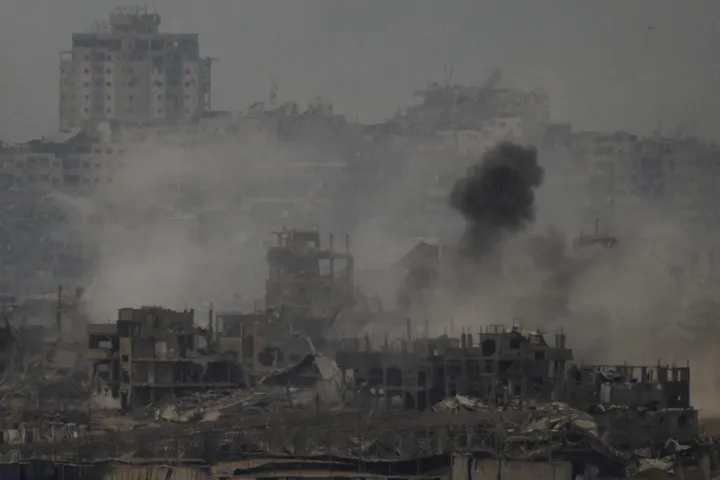Israel’s ongoing war on Gaza has exacted a heavy emotional toll not just on Palestinians but on millions of people worldwide. Scrolling through social media feeds, the images of death and destruction have instilled a deep sense of guilt in many people, leading many to contemplate whether they deserve to survive.
Complex feelings of sorrow and remorse overwhelm them, forcing them down the rabbit hole – they can’t get over the reality of having survived while others have perished.
Sahar al Najjar, a US-based clinical psychologist, says that survivor's guilt emerges as a visceral response to traumatic events.
“Surviving atrocities while being abroad and away from loved one’s manifests in feeling like one isn’t doing enough. More specifically, one can begin to wish that they can take the pain away from those facing oppression directly,” Najjar, who’s also a psychology professor at Triton College, Illinois, tells TRT World.
Surviving atrocities while being abroad and away from loved one’s manifests in feeling like one isn’t doing enough, Al-Najjar explains. “More specifically, one can begin to wish that they can take the pain away from those facing the oppression directly,” she said.
Signs and symptoms of survivor's guilt can often include flashbacks of the event, trouble sleeping and/or dreams about the event, irritability and agitation, intrusive thoughts, decline in mood and/or a sense of diminished ipseity, loss of interest in favourite activities, feelings of helplessness or hopelessness.
From family members killed in Israeli bombings to people, including children, traumatised by witnessing destruction firsthand, grief has touched every corner of life in Gaza.
The constant fear and uncertainty only heighten these feelings, leaving people feeling isolated and drained, Nihaya Abu Rayyan, a Senior Narrative therapist & Clinical Social Worker at Palestinian Narrative Institute (PNI), tells TRT World.
“Grief cannot be compartmentalised by Palestinians amidst the ongoing genocide – it is a multifaceted and continuous process,” she adds.
Surviving atrocities while being abroad and away from loved one’s manifests in feeling like one isn’t doing enough. More specifically, one can begin to wish that they can take the pain away from those facing oppression directly
“This moment is uncomfortable for many as they grapple with profound losses: homes, family members, friends, safety, sleep, and health. Each loss contributes to a complex and ongoing journey of grieving, with no clear stages or endpoint. Every moment in the midst of genocide brings fresh waves of grief, as individuals bear witness to the suffering of their loved ones and communities.”
Disappointment with the international community, particularly politicians, adds another layer of grief as Palestinians lose faith in human rights and justice, Abu Rayyan says.
She emphasised that grief takes on various forms and stages, influenced by factors such as loss of control, imprisonment, and the surrender of agency to others.
Abu Rayyan stresses the importance of resisting the temptation to suppress grief, as it serves as a poignant reminder of the enduring struggle against oppression.
Neutrality = oppression
According to Najjar, much of the grief stems from ethical and moral concerns about academic institutions' failure to address global atrocities and how this impacts individuals who identify as Palestinian, including students and faculty.
“It is the very programs that train socially responsible practitioners to work with vulnerable populations that often fail to centre Palestinian psychologists in training doing the emotional labour to educate and support others. There is a critical responsibility to uplift the psychological welfare of those most marginalised,” she says.
“Neutrality towards any human suffering and trauma, especially in clinical work, directly contributes to systemic oppression.”
Palestinians see grief as an act of defiance, to be able to exist and persist towards life in every way they are invisibilized and robbed of life here in the diaspora and in occupied Palestine, Najjar adds.
Speaking to TRT World, several people described experiencing guilt and dissociation from a sense of inadequacy in responding to the situation in Gaza, where the death toll has now reached more than 33,000.
However, Najjar says it can serve as a powerful catalyst for action, pushing individuals to contribute positively.
“The only way out is through. Our anger is often policed. Feel all the emotions, feel all the rage, feel all the betrayal, feel all the things. We are not okay, and no one should be okay in a genocide,” she says.
“Palestinians are tired, we are heartbroken, and yet we refuse to lose touch with our humanity. We have witnessed increased attacks on our scholarships, interrogation, subjugation, and dehumanisation for merely breathing, for merely existing, for merely, resisting to stay silent in the face of a genocide.”
Najjar thinks Palestinians have not been able to grieve and mourn the atrocities occurring in Gaza without being expected to continually explain why they deserve compassion and empathy amidst collective trauma.
“We are dehumanised when we are tasked with educating others why we must be treated like humans,” she said.
“With over 75 years of occupation, dehumanisation, and dispossession, our grief is not contextless or limitless. Anytime someone is murdered in Palestine each day, a piece of us dies with them, even across borders of this world.”























